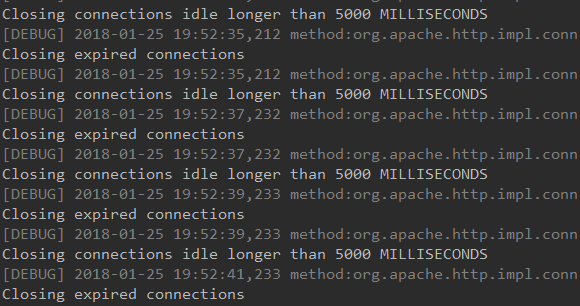发表于: 2018-01-25 20:00:01
1 646
今日完成
1,分布式与集群概念的理解
(1)什么是分布式与集群————一个很形象的例子
(2)了解什么是RMI(remote mthod invcation),即远程方法调用。它是一种机制,能够让在某个 Java 虚拟机上的对象调用另一个 Java 虚拟机中的对象上的方法。可以用此方法调用的任何对象必须实现该远程接口。
Java RMI不是什么新技术(在Java1.1的时代都有了),但却是是非常重要的底层技术。
大名鼎鼎的EJB都是建立在rmi基础之上的,现在还有一些开源的远程调用组件,其底层技术也是rmi。
在大力鼓吹Web Service、SOA的时代,是不是每个应用都应该选用笨拙的Web Service组件来实现,通过对比测试后,RMI是最简单的,在一些小的应用中是最合适的。
下面通过一个简单的例子来说明RMI的原理和应用,下面这个例子是一个简单HelloWorld,但已涵盖RMI的核心应用与开发模式。
2.将以前的项目中的service分离出来。
(1)配置dervice的RMI 服务端。
<!--配置对应服务的实现类-->
<bean id="studentServiceImpl" class="lujing.serviceimpl.StudentServiceImpl"/>
<!--配置spring的RMI启动服务-->
<bean id="exporter1" class="org.springframework.remoting.rmi.RmiServiceExporter">
<property name="serviceName" value="StudentService"/>
<property name="service" ref="studentServiceImpl"/>
<property name="serviceInterface" value="lujing.service.StudentService"/>
<property name="registryPort" value="8562"/>
</bean>
<bean id="indexServiceImpl" class="lujing.serviceimpl.IndexServiceImpl"/>
<bean id="exporter2" class="org.springframework.remoting.rmi.RmiServiceExporter">
<property name="serviceName" value="IndexService"/>
<property name="service" ref="indexServiceImpl"/>
<property name="serviceInterface" value="lujing.service.IndexService"/>
<property name="registryPort" value="8562"/>
</bean>
(2)在客户端配置接受的容器,同样使用spring管理。
<!--SpringRMI-->
<bean id="proxy" class="org.springframework.remoting.rmi.RmiProxyFactoryBean">
<property name="serviceInterface" value="lujing.service.StudentService"/>
<property name="serviceUrl" value="rmi://192.168.31.44:8562/StudentService"/>
</bean>
<bean id="proxy2" class="org.springframework.remoting.rmi.RmiProxyFactoryBean">
<property name="serviceInterface" value="lujing.service.IndexService"/>
<property name="serviceUrl" value="rmi://192.168.31.44:8562/IndexService"/>
</bean>
这里需要注意:客户端的service接口与服务端的service一定要一致才可以。
配置好了之后启动服务端的容器。spring能够自动启动RMI的服务。
在客户端配置对应RMI代理工厂,对接service的实现类。
public static void main(String[] args) {
ApplicationContext context = new ClassPathXmlApplicationContext("spring/applicationContext-service.xml");
StudentService xx = context.getBean("proxy",StudentService.class);
IndexService indexService = context.getBean("proxy2",IndexService.class);
System.out.println(xx.findStudentList(null));
System.out.println(indexService.selectLearnALL());
}
}
启动一下。,能够打印出实现类对应的信息。说明链接成功了。

遇到问题:
1.服务端实现了自动注入,客户端怎么自动注入service的实现类?
2.WEB项目中怎么实现bean使用的时候再加载呢?

因为昨天把腾讯云的客户端配置成立由spring管理,在加载项目以及spring容器的时候就自动注入了该客户端。但是该客户端并没有被使用,也无法关闭。
所以一直报连接超时的问题。


明日计划
1.将服务端与客户端完全分离,部署上服务器。
收获
1.初步了解了分布式的设立模型。





评论